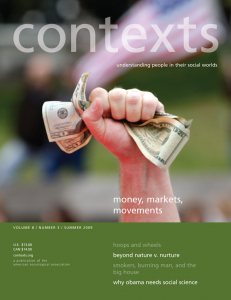
Summer 2009
Volume: 8 | Number: 3
Children and Gender
A research methods course provides a sociology student the opportunity to examine first-hand how children “do” gender in the 21st century. Read More
Documenting Social Change
Around 1978 I began using photographs to study social change. Clearly not all social change is visible, but much of it is, especially … Read More
Controversial Emails, a Sociologist at the Census and Conflicted Fathers
Every issue we provide a roundup of sociologists, and sociology, in the news. This issue includes controversial emails by William I. Robinson covered by … Read More
Safe At Home
We’re more likely to hear about crime than experience it firsthand. Social scientists are coming to appreciate how profoundly this fact is impacting beliefs about crime and shaping the way we live in the United States. The research suggests fear of crime is driving us out of the public square and into our homes, and may contribute to both public and scholarly concerns about declining social capital. Read More
Hoops and Wheels
Because disability sports are segregated from able-bodied sports, they’re typically relegated to second-class status, as if only “natural” bodies play natural sports and “unnatural” bodies play unnatural sports. A closer look at the sport of wheelchair basketball suggests new conceptions of sport and bodies may be in order. Read More
When Markets Become Contentious
Protests against corporations, industries, and markets themselves have been especially evident in recent years, especially those demanding product recalls, urging more equitable hiring policies, or challenging the morality of a company. This article explains what such protests can and can’t achieve. Read More
Nonprofits in Need
When housing collapses or failing businesses stand to ruin a community, nonprofits come to the rescue and in myriad ways temper the devastation. But what happens when the entire economy fails, taking with it the resources nonprofits depend upon to provide those services? According to the five sociologists Contexts turned to for answers, it means times will be harder than we might have expected, but the outcome not as devastating as we thought. Read More
A Sociology of Bubbles
A re-examination of the recent economic meltdown reveals not only the institutional roots of the collapse but the social foundations of markets themselves. Three aspects of the collapse seem particularly amenable to sociological analysis: bond-rating agencies and how they “know” what they think they know; the social networks and personal connections that encourage “herding” among financial elites; and the political consequences of recent transformations in investment. Striking in all this is the contrast between the massive scale of the global finance system and the concentrated, tight-knit nature of the financial community that helped create it. Read More
Sociology and Socialism
In the short time we’ve held the editorial reins, we’ve taken every opportunity to talk up Contexts, civic engagement, and public sociology. Some … Read More
Love Me, Love My…
Our pets, deceased loved ones, robots, and even computer-generated artworks are just some of the unconventional characters taking their place among Americans’ circles of companions and confidantes. This trend prompts a reflection on who or what is a social actor, and who or what makes up a person’s social networks. Read More
